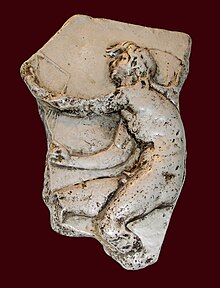Kairos
Kairos (καιρός) is an auncient Greek wird meanin the richt or opportune moment (the supreme moment). The auncient Greeks haed twa wirds for time, chronos an kairos. Whilk the umwhile refers tae chronological or sequential time, the latter signifies a time atween, a moment o indeterminate time in which somethin special happens. Wha the special something is depends on who is uisin the wird. While chronos is quantitative, kairos haes a qualitative natur.[1] Kairos (καιρός) means wather in baith auncient an modren Greek an aw. The plural, καιροι (kairoi or keri) means the times.

References
eeditMark Freier (2006) "Time Measured by Kairos and Kronos" Archived 2012-04-25 at the Wayback Machine
- ↑ "Mark Freier (2006) "Time Measured by Kairos and Kronos"" (PDF). Archived frae the original (PDF) on 28 Julie 2011. Retrieved 6 Januar 2013.
Resources
eedit- R. B. Onians, The Origins of European Thought (Cambridge: Cambridge University Press, 1951), pp 343–49
- E. C. White Kaironomia: on the will to invent (Ithaca and London: Cornell University Press, 1987)
- Leonard Sweet Missed Moments (Rev. Magazine Jan/Feb 2005), pp. 36
- Paolo Moreno, L'attimo fuggente in Archeo magazine (XXII, 10, 260), October 2006, pp 114–117.
- Mick Doherty "Kairos: Layers of Meaning Archived 2009-03-17 at the Wayback Machine" (Dept of English, Texas Tech University)
- London, Jack. “To Build a Fire.” Lost Face. New York: The Macmillan Company, 1910.